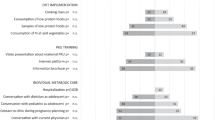Summary
The aim of this study was to compare the level of maternal knowledge and the blood phenylalanine (Phe) control in phenylketonuria (PKU; OMIM 261600). The study was conducted on 144 children (81 boys, 63 girls) with PKU, aged between 1 and 15 years, at Hacettepe University Ihsan Dogramaci Children’s Hospital, Metabolism and Nutrition Unit. All subjects were treated with a low-Phe diet using a Phe-exchange system. A 20-question multiple-choice questionnaire was applied to the mothers to determine their knowledge about PKU and its dietary treatment. Questions in the test consisted of the knowledge about the disease (6 questions), general dietary knowledge (14 questions) and knowledge about specific exchange within the dietary questions (6 questions). The median blood Phe concentration for the previous 3-year period was used as an indicator of metabolic control. Eighty-seven children had a median blood Phe concentration above the MRC Working Party Guidelines. There was a negative correlation between maternal knowledge about exchange and median blood Phe concentration in the child (p<0.05). Maternal knowledge about a standard 15 mg Phe exchange system is correlated with dietary compliance as measured by blood Phe concentrations in our subjects. We would like to implement an easier method of measuring Phe exchanges to improve dietary knowledge in the mothers.
Similar content being viewed by others
Abbreviations
- PKU:
-
phenylketonuria
- Phe:
-
phenylalanine
- HPA:
-
hyperphenylalaninaemia
- MRC:
-
Medical Research Council
- TDHS:
-
Turkish Demographic and Health Survey
References
Bekhof J, van Spronsen FJ, Crone MR, Oudshoorn CGM, Verkerk PH (2003) Influence of knowledge of the disease on metabolic control in phenylketonuria. Eur J Pediatr 162: 440–442.
Levy HL, Waisbren SE (1994) PKU in adolescents: rationale and psychological factors in diet continuation. Acta Paediatr Suppl 407: 92–97.
MacDonald A (2000) Diet and compliance in phenylketonuria. Eur J Pediatr 159(Supplement 2): S136–S141.
MacDonald A, Rylance GW, Asplin DA, Hall K, Harris G, Booth IW (1994) Feeding problems in young children with PKU children. Acta Paediatr Suppl 407: 73–74.
MacDonald A, Asplin D, Daly A, Chakrapani A, Hall SK (2004) PKU at Home: an observational study. SHS, Inborn Error Review Series No: 14. Dietary management of metabolic disease. London: Royal College of Physicians.
MRC (1993) Recommendations on the dietary management of phenylketonuria. Report of a Medical Research Council Working Party on Phenylketonuria. Arch Dis Child 68: 426–427.
National Institutes of Health Consensus Development Panel (2001) National Institutes of Health Consensus Development Conference Statement: Phenylketonuria: Screening and Management, October 16–18, 2000. Pediatrics 108(4): 972–982.
Ozalp I, Coskun T, Tokatlı A, et al (2001) Newborn PKU screening in Turkey: at the present and organization for future. Turk J Pediatr 43: 97–101.
Tuncbilek E (2001) Clinical outcomes of consanguineous marriages in Turkey. Turk J Pediatr 43: 277–279.
Turkey Demographic and Health Survey (2003) Hacettepe University Institute of Population Studies, Ankara, October.
Walter JH, White FJ, Hall SK, et al (2002) How practical are recommendations for dietary control in phenylketonuria? Lancet 360: 55–57.
Acknowledgements
The authors thank chemists Suzan Tokol and Hatice Onat for their measurements of blood Phe levels, Anita MacDonald, BSc, RD, PhD for critically reading the manuscript, and all patients and parents who participated in this study.
Author information
Authors and Affiliations
Corresponding author
Additional information
Communicating editor: Michael Gibson
JIMD Short Report #111 (2008) Online
Competing interests: None declared
References to electronic databases: PKU: OMIM 261600. HPA: OMIM 261600.
Rights and permissions
About this article
Cite this article
Gokmen Ozel, H., Kucukkasap, T., Koksal, G. et al. Does maternal knowledge impact blood phenylalanine concentration in Turkish children with phenylketonuria?. J Inherit Metab Dis 31 (Suppl 2), 213–217 (2008). https://doi.org/10.1007/s10545-008-0775-3
Received:
Revised:
Accepted:
Published:
Issue Date:
DOI: https://doi.org/10.1007/s10545-008-0775-3




